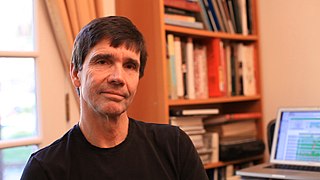A Quote by Steve Jobs
We're going to be able to ask our computers to monitor things for us, and when certain conditions happen, are triggered, the computers will take certain actions and inform us after the fact.
Related Quotes
Run for your lives-the computers are invading. Awesomely powerful computers tackling ever more important tasks with awkward, old-fashioned interfaces. As these machines leak into every corner of our lives, they will annoy us, infuriate us, and even kill a few of us. In turn, we will be tempted to kill our computers, but we won't dare because we are already utterly, irreversibly dependent on these hopeful monsters that make modern life possible.
I think you've got to accept that certain things are in process that you can't change, that you can't overwhelm. The chaos of our cities, the randomness of our lives, the unpredictability of where you're going to be in ten years from now - all of those things are weighing on us, and yet there is a certain glimmer of control. If you act a certain way, and talk a certain way, you're going to draw certain forces to you.
Everything is being run by computers. Everything is reliant on these computers working. We have become very reliant on Internet, on basic things like electricity, obviously, on computers working. And this really is something which creates completely new problems for us. We must have some way of continuing to work even if computers fail.
At the age of 5, when I was in kindergarten, I often used to pass by the computer labs and see students doing work on computers. I realized that calculation, which would take us a long time to do, can be done in less than a second with the help of computers. So that is how my interest in computers began.
In our age of individualism, we see computers as ways through which we can express our individuality. But the truth is that the computers are really good at spotting the very opposite. The computers can see how similar we are, and they then have the ability to agglomerate us together into groups that have the same behaviours.
With genetic engineering, we will be able to increase the complexity of our DNA, and improve the human race. But it will be a slow process, because one will have to wait about 18 years to see the effect of changes to the genetic code. By contrast, computers double their speed and memories every 18 months. There is a real danger that computers will develop intelligence and take over. We urgently need to develop direct connections to the brain so that computers can add to human intelligence rather than be in opposition.
By the time we get to the 2040s, we'll be able to multiply human intelligence a billionfold. That will be a profound change that's singular in nature. Computers are going to keep getting smaller and smaller. Ultimately, they will go inside our bodies and brains and make us healthier, make us smarter.
For policemen to be honest about the fact that they may be fearful when they come into a certain situation, not understanding what's going to happen. The only way things will change and things will get better is if people are able to be honest without feeling like they're going to be offended, or they're going to offend someone else.
Computers get better, faster than anything else ever. A child's PlayStation today is more powerful than a military supercomputer from 1996. But our brains are wired for a linear world. As a result, exponential trends take us by surprise. I used to teach my students that there are some things, you know, computers just aren't good at like driving a car through traffic.




































